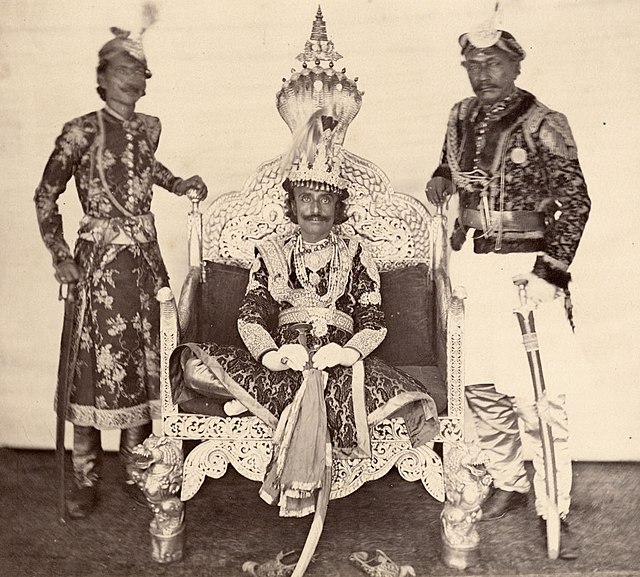Top Qs
Timeline
Chat
Perspective
Surendra Bikram Shah
King of Nepal from 1847 to 1881 From Wikipedia, the free encyclopedia
Remove ads
Surendra Bikram Shah (Nepali: श्री ५ महाराजाधिराज सुरेन्द्र विक्रम शाह देव), (20 October 1829 – 17 May 1881), was King of Nepal. He became the king after Prime Minister Jung Bahadur Rana forced the abdication of his father, Rajendra Bikram Shah. Surendra was effectively reduced to a figurehead, with Rana being the de facto ruler of the country.
Remove ads
Early life
Surendra was the son of King Rajendra and his first wife, Queen Samrajya. He was born the crown prince of Nepal and was relatively unpopular.
Prince regent
Surendra's stepmother, Queen Rajya Lakshmi, was ambitious to have her son, Prince Ranendra, sit on the throne. However, Jung Bahadur Rana, who was ambitious and wanted power, might have cooperated with Rajya Lakshmi for his own motive. After the Kot massacre, in which Rana managed to eliminate a large number of nobles, Rana turned against the queen, who in turn plotted to kill him (though the plot failed). Considering Queen Rajya Lakshmi a threat to himself, Rana, who had become the prime minister, exiled Rajya Lakshmi to Varanasi. King Rajendra also accompanied her to Varanasi. Before leaving, he made Surendra the prince regent. However, later Rana forced the abdication of King Rajendra, and then Surendra was made the king.[1]
Remove ads
Life as the king
Summarize
Perspective

King Surendra was like a prisoner in his own palace: with the exception of his immediate family, nobody could visit him without the permission of Jung Bahadur Rana. The king was only allowed to read literature. Frustrated at these circumstances, the king wanted to abdicate in favor of his eldest son Trailokya, but the Rana did not allow it.
Surendra was allowed to meet his father, the ex-king Rajendra, once every month. Rajendra continued to live under house arrest until his death.
In 1856, King Surendra issued a sanad- which formalized the dominance and political leadership of the Kunwar family- the family of Jung Bahadur Rana. The king and his descendants could use the honorific title of 'Shri' five times with their names, while the members of the Kunwar family used the title thrice- placing the Kunwar family in a rank that was second only to the royal family. While Surendra remained the king (Maharajadhiraja), he had little power; Jung Bahadur Rana ruled the country.[2]
Surendra's son, General and Crown Prince Trailokya Bir Bikram Shah Deva married three of Jung Bahadur Rana's daughters, Tara Rajya Lakhsmi Devi, Lalit Rajeshwori Rajya Lakshmi Devi and Hiranyagarbha Kumari Devi.[citation needed] Trilokya died in 1878, and Trilokya's son Prithvi Bir Bikram Shah became heir to the throne.
Death

Surendra died in 1881. His grandson Prithvi succeeded him as the king of Nepal.
References
External links
Wikiwand - on
Seamless Wikipedia browsing. On steroids.
Remove ads

